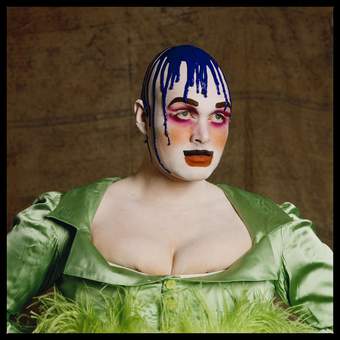
Fergus Greer, Leigh Bowery Session I Look 2 1988 © Fergus Greer. Courtesy Michael Hoppen Gallery.
This Spring, Tate Modern will celebrate the provocative and boundary-pushing career of Leigh Bowery - one of the most fearless and original artists of the 20th century. In his short but extraordinary life, Bowery (1961-1994) forged a truly unique path. Known variously as an artist, performer, club kid, model, TV personality, fashion designer and musician, Bowery took on many different roles but always refused to be limited by convention. He reimagined clothing and makeup as forms of sculpture and painting, tested the limits of decorum, and created a new form of performance art to explore the body as a shape-shifting tool with the power to challenge norms of aesthetics, sexuality and gender. For the first time, Tate Modern will bring together Bowery’s outlandish and dazzling costumes alongside painting, photography and videos to explore how he changed art, fashion and popular culture forever. Charting the journey of a young boy from the quiet suburb of Sunshine in Melbourne, Australia, who became a globally recognised cultural figure, Leigh Bowery! offers a portrait of an outrageous, complex and creative figure who left a distinct and undeniable mark on contemporary art and beyond.
Moving from the club to the stage, to the gallery and beyond, visitors are invited to step inside Bowery’s dynamic creative world. Opening with his arrival in London from Australia in 1980, the exhibition will delve into Bowery’s impact on the city’s infamous nightlife scene. Emerging alongside a network of notable figures such as Scarlett Cannon, Boy George and Princess Julia, Bowery cemented his international reputation with the launch of his own club night called ‘Taboo’ in 1985 – a liberating space offering Bowery and friends the freedom to explore their identity and transform themselves. Famously asking “How many meanings has “Ok” got?!” Bowery thrived on appearing exceptional. He quickly learned the social currency of turning a ‘Look’ and set himself apart from the crowd through his bold and distinctive style. Visitors will be able to get up close to the intricate costumes he hand-crafted with collaborator Nicola Rainbird, who later became his wife, and corsetier Mr Pearl, while photographs by Fergus Greer illustrate how Bowery brought these to life in animated ways. A music and video installation by filmmaker and DJ Jeffrey Hinton, made especially for the exhibition, will convey the frenzied excitement of the Taboo-era, transporting audiences back to a vibrant underground community.
With the energy and reverie of Taboo still echoing in the distance, Bowery pirouetted out of the nightclub and onto the stages of the dance and art worlds. In 1984, Bowery was invited to design the costumes for Michael Clark’s dance works, beginning a collaboration that would last almost a decade. His work with Clark will be represented in the exhibition through excerpts of Charles Atlas’s quasi-fictionalised documentary Hail the New Puritan 1985, and the film Because We Must 1989. Bowery’s exhibitionism came to the fore when staging his ‘mirror’ performance in 1988, where for five days he dressed up and posed in front of a two-way mirror, allowing viewers to watch him while he was oblivious to their gaze. Staging not just his body but the very act of looking, Bowery reimagined the sterility of the gallery scene as a social space. Filmmaker Dick Jewell’s (What’s Your Reaction to the Show? 1988) will reveal the honest opinions of the cast of friends, colleagues and passersby who witnessed this ambitious performance.
It was Bowery’s close friendship with Lucian Freud that marked a turning point in his relationship with the contemporary art world in the late 1980s. Several of Freud’s personal portraits of Bowery will be displayed at Tate Modern, showing how the renowned artist presented a fresh view of this flamboyant performer. Prompted by the intimacy of posing for Freud, Bowery increasingly began using his body as raw material, notably stating “flesh is the most fabulous fabric”. Portraits by photographers including Nick Knight and films by Charles Atlas and John Maybury will show how Bowery was able to use his body as a form of contemporary surrealism, reimagining himself as an alien-like creature. This extended to his notorious ‘birth’ performances, in which Bowery strapped Nicola Rainbird to his chest and gave ‘birth’ to her on stage, showing just how much he pushed the limits of the human form.
The exhibition will culminate with Bowery’s foray into music with his band Minty. Uniting his love of performance, shock value and humour, it enabled him to achieve the full expression of his creative ideas, showcasing his constant desire to experiment, take risks and create a space for questions. Bowery’s final performance at London’s Freedom Café in November 1994 was attended by a young Lee ‘Alexander’ McQueen and Lucian Freud, demonstrating how far-reaching his influence on the worlds of both art and fashion had become.
